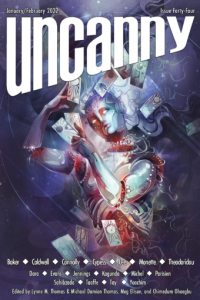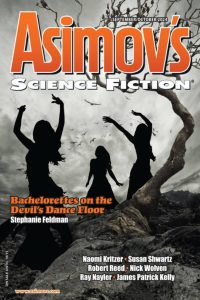Paula Guran Reviews Short Fiction: Tor.com, PodCastle and Uncanny
 Tor.com 2/26/22, 2/9/22, 1/26/22, 1/12/22
Tor.com 2/26/22, 2/9/22, 1/26/22, 1/12/22
PodCastle 1/18/22, 2/8/22
Uncanny 1-2/22
If you’ve read the three previous Judge Dee stories by Lavie Tidhar, you are sure to enjoy the new one, “Seven Vampires: A Judge Dee Mystery” (Tor.com 2/26/22). You can enjoy it even if you haven’t chanced upon the series previously, but since the three earlier tales are easily found online, you have no excuse not catch up. Judge Dee is an ancient vampire who not only pronounces judgment and passes sentence but also carries out the punishments on erring fellow fangsters. His long-suffering human companion Jonathan is always hungry, seldom warm, and never happy, but, overall, as content as one can be in his situation. Wherever the Judge goes, he discovers a murder and, rather like a cozy Agatha Christie detective, he solves it. Amusing as always.
A small town isolated by a “time-haze” and, especially, a boy who yearns to escape the drudgery of daily consistency are brought to vivid life in “The Chronologist” by Ian R. MacLeod (Tor.com 2/9/22). A visit from the mysterious Chronologist, who resets the town’s temporal regularity, and the boy’s own stubborn persistence provide an avenue out. The conclusion is one that might not have been written by a very young writer but is one that maturity proves to be true. Superb, wonderfully descriptive writing.
“The Tale of Ak and Humanity” (Tor.com 1/26/22) by Yefim Zozulya is far from a new story. Written not long after the Bolshevik Revolution, it was originally published in Russia over a century ago and translated into English at least once before. This new translation by Alex Shvartsman surely does justice to Zozulya’s stygian humor and cutting satirical take on just how absurd – and cruel – humanity can be.
Kemi Ashing-Giwa’s “Fruiting Bodies” (Tor.com 1/12/22) is a fast-paced piece of science fictional horror. A generation ship has crashed on the faraway and inhospitable planet Kushisha. The reluctant colonists are infected by a fungus that turns them into zombie-like “arinkiri.” Mycologist Inyama has received an experimental serum from physician (and lover) Morayo. Now, a handful of dying survivors have kidnapped Morayo and Inyama sets out to rescue her. The reasons for the kidnapping, as stated, confused me, but aren’t that important to the story. There’s not enough action for it to be cinematic and not enough detail to be profound, but it is entertaining for what it is.
The magic mirror from “Snow White” takes center stage in “Memoirs of a Magic Mirror” by Julia Knowles (PodCastle 718). As the mirror explains: “‘I must answer every question and I cannot tell a lie. It’s not precisely the same thing.’ Technicalities were significant in my line of work.” Clever and fun.
In “A Chestnut, A Persimmon, A Cunning Lie” (PodCastle 721) by Michelle Denham, Haewon’s little sister Hyojin is reincarnated as a tiger-hearted girl. Having a tiger for a sister complicates life immensely for Haewon and her mother, but it is worth it. This is a charming tale of how love, family, a chestnut, a persimmon, and a cunning lie can shape reality and life.
Uncanny #44 presents seven new stories. As an unabashed fan of Sarah Monette’s Kyle Murchison Booth weird detective series, I gleefully read “The Haunting of Dr. Claudius Winterson”, a tale of spectral children plaguing a scholarly doctor. My only criticism: too short. But then, I always want more Booth.
Kylie Lee Baker’s “Lily, the Immortal” is a cautionary tale of sorts. When Lily, a vlogging star, dies, her lover Airi – whose existence, despite the strong relationship, is never publicly, let alone legally, acknowledged – has no control over Lily’s digital image and personality. The “Entertainment Commission” buys the rights, and an AI resurrection takes place: Lily exists online and in holographic form and generates profits for them. Lily will, in this form, “live” forever. Where does that leave a grieving mortal? Thought provoking.
Leah Cypess’s engaging “The Night Dance” is based on “The Twelve Dancing Princesses” (at least that’s the title of the Brothers Grimm version). Cypess asks if it is “better to dance briefly and brightly, to be truly alive for a short time,” or “trudge through a long empty lifetime like most mortals do.” The answer is not as clear-cut as one might expect.
Natalia Theodoridou weaves threads from many fairy tales together in “Ribbons”, which deftly and emotionally explores acceptance of oneself and one’s identity.
Christopher Caldwell attempts a great deal in the relatively short space of the richly rendered “The Calcified Heart of Saint Ignace Battiste”. A young acolyte discovers the faith upon which his city exists is founded on is false but does not reveal the truth and remains within the religion. As time goes on, there are hints that the city may not be as safe as it once was. Is this the result of the breaking of a holy covenant or merely proof that everything is transitory? This is a story with merit but needing further development.
In Wen-yi Lee’s interesting “Hundred-Handed One”, a child is born with one hundred arms. Its family attempts “to offer up the horrors to the ocean” and hopes “the wax and wane of the seas” will bring back “something transformed.” The child is, indeed, transformed and eventually returns to the family, to telling effect.
Tina Connolly explains “How to Safely Store Your Magical Artifacts After Saving the World” in her flash story of that title. An apt reminder that no matter how many times the world is saved, it always has to be saved again.
Paula Guran has edited more than 40 science fiction, fantasy, and horror anthologies and more than 50 novels and collections featuring the same. She’s reviewed and written articles for dozens of publications. She lives in Akron OH, near enough to her grandchildren to frequently be indulgent.
This review and more like it in the April 2022 issue of Locus.
 While you are here, please take a moment to support Locus with a one-time or recurring donation. We rely on reader donations to keep the magazine and site going, and would like to keep the site paywall free, but WE NEED YOUR FINANCIAL SUPPORT to continue quality coverage of the science fiction and fantasy field.
While you are here, please take a moment to support Locus with a one-time or recurring donation. We rely on reader donations to keep the magazine and site going, and would like to keep the site paywall free, but WE NEED YOUR FINANCIAL SUPPORT to continue quality coverage of the science fiction and fantasy field.
©Locus Magazine. Copyrighted material may not be republished without permission of LSFF.







